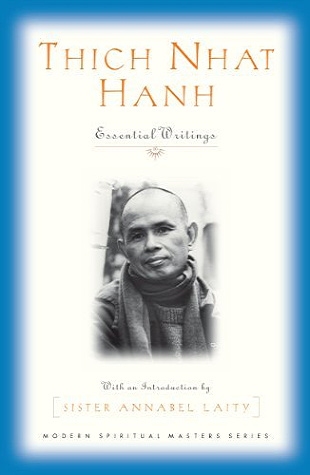"Gathas for Daily Life was a warrior's manual on strategy. As novices, we were handed it when we entered the monastery and instructed to keep it close at hand at all times, even to use it as a pillow at night. The verses in it taught us how to stay present with our own minds in order to observe ourselves throughout the ordinary actions of daily life: eating, drinking, walking, standing, lying down, and working. It was as difficult as trying to find a stray water buffalo by following its zigzagging tracks. It is not easy to follow the path of return to your own mind. The mind is like a monkey swinging from branch to branch. It is not easy to catch a monkey. You have to be quick and smart, able to guess which branch the monkey will swing to next. It would be easy to shoot it, but the object here is not to kill, threaten, or coerce the monkey. The object is to know where it will go next in order to be with it. That thin book of daily verses provided us with strategies. The verses were simple, yet remarkably effective. They taught us how to observe and master all the actions of body, speech, and mind. For instance, when we washed our hands, we said to ourselves:
Washing my hands in clear water,
I pray that all people have pure hands
to receive and care for the truth.
"The use of such gathas encourages clarity and mindfulness, making even the most ordinary tasks sacred. Going to the bathroom, taking out the garbage, and chopping wood become acts infused with poetry and art.
"Even if you have the perseverance to sit for nine years facing a wall, sitting is only one part of Zen. While cooking, washing dishes, sweeping, carrying water, or chopping wood, you dwell deeply in the present moment. We don't' cook in order to have food to eat. We don't wash dishes to have clean dishes. We cook to cook, and we wash dishes to wash dishes. The purpose is not to get these chores out of the way in order to do something more meaningful. Washing the dishes and cooking are themselves the path to Buddhahood. Buddhahood does not come from long hours of sitting. The practice of Zen is to eat, breathe, cook, carry water, and scrub the toilet — to infuse every act of body, speech, and mind — with mindfulness, to illuminate every leaf and pebble, every heap of garbage, every path that leads to our mind's return home. Only a person who has grasped the art of cooking, washing dishes, sweeping, and chopping wood, someone who is able to laugh at the world's weapons of money, fame, and power, can hope to descend the mountain as a hero. A hero like that will traverse the waves of success and failure without rising or sinking. In fact, few people will recognize him as a hero at all."
